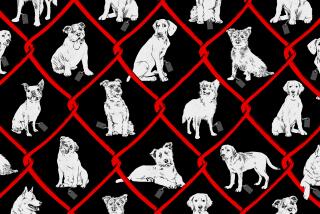The Mongrel Gatsby, Scorned by Club Society : Dogs: The AKC still snubs mutts in its obedience trials. But the battle is joined.
- Share via
It takes a year to train a dog for scent hurdles, and Gatsby Harmetz has been practicing every Wednesday night for the last six months. (The West Los Angeles Obedience Training Club gives all of its four-footed members the family surname, so the newsletter sounds like it belongs to a nursery school for yuppies.) Scent hurdles is a team sport, four dogs on a relay team. Each dog races over four hurdles, finds and picks up its own dumbbell and races back. Gatsby is willing but not too efficient yet, fleet of paw but two seconds slow in sniffing and grabbing her dumbbell. However, the caliber of her performance is not the reason we had to stay home last Memorial Day weekend while her friends went out and competed.
Gatsby’s dirty little secret is that she is, in obedience club jargon, an All-American. Like other compound nouns ending in American, she is culturally mixed--her mother a purebred cocker spaniel, her father an equally purebred beagle. The American Kennel Club refused to allow her past the gate at the big show at the L.A. County fairgrounds. After all, if All-Americans were allowed to sit and heel in the same ring with purebreds, they might next want to drink out of adjoining water bowls. (More intimate fraternization is unlikely, since most obedience-club All-Americans are spayed or neutered.) And, really, wouldn’t Gatsby be more comfortable with her own kind?
She wasn’t even allowed to sit on the sidelines and bark her teammates on. So Sascha Estes, Max Kihara, KoKo Kiley and Annie Means hopped onto the back seats of their vans and station wagons, while Gatsby stayed home. West L.A. sent a German shepherd and a miniature schnauzer, an Australian cattle dog, a Doberman and a golden retriever. And the mongrelization of the species was avoided.
“There’s a lot of money involved in breeding,” says one training club member, “and they don’t want a mutt to outshine a dog that brings them money.” If she gets good enough, Gatsby will be able to race two or three times a year in separate but not very equal fun matches at public parks.
Ironically, if Gatsby were to pretend to be a spaniel or a beagle, she would be allowed into the AKC race. Any animal-shelter dog that can pass for a recognized breed can get a special dispensation.
Since obedience trophies are based on performance, not on bloodlines or the proper curl of a tail, a few obedience clubs are fighting to let mixed breeds compete. Four years ago, Top Dog, a major event sponsored by the Southern California Dog Council, was pressured to let All-Americans leap barriers, make figure eights and respond to silent commands next to poodles and Afghan hounds. Top Dog is a tough competition with only two dogs from each club allowed in each category. Last year, first place in Novice went to an Australian shepherd, a breed that wasn’t then recognized by the Kennel Club. Second place went to Tippy Estes, a mutt rescued from the pound. Third place went to another All-American.
The winners at Top Dog are supposed to compete for the state championship against the Northern California champions. But the North refused to compete with All-Americans. So Tippy, like Gatsby, stayed home.
Mutts are often smarter than purebreds, but I doubt that Gatsby knows she is a cocker-beagle mix or that scent hurdles is not an equal-opportunity occupation. Perhaps she can console herself with what poet Charles Kingsley wrote 127 years ago: “Young blood must have its course, lad, and every dog his day.” Make that read: Every mutt her day.






